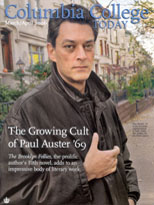Difference between revisions of "Paul Auster"
| Line 7: | Line 7: | ||
Despite being a rather quiet, bookish student who preferred little more than a drin at the old [[West End]], Auster somewhat passively participated in the [[1968 protests]], hanging out in [[Mathematics Hall]] during the occupation and getting beaten and arrested by the [[NYPD]]. Later, he described himself as "crazy" during the period and found the protests to have been somewhat misdirected. | Despite being a rather quiet, bookish student who preferred little more than a drin at the old [[West End]], Auster somewhat passively participated in the [[1968 protests]], hanging out in [[Mathematics Hall]] during the occupation and getting beaten and arrested by the [[NYPD]]. Later, he described himself as "crazy" during the period and found the protests to have been somewhat misdirected. | ||
| − | After graduating, he spent a year in [[GSAS]] studying English. | + | After graduating, he spent a year in [[GSAS]] studying English. Much later, he was a one-semester writing professor at the [[School of the Arts]], and said that his return to campus made him realize that he had been "much unhappier" as an undergrad than he had realized. In other words, he's like most Columbia alumni, only famous. |
==External links== | ==External links== | ||
Revision as of 15:20, 23 April 2008
- See also Wikipedia's article about "Paul Auster".

Paul Auster CC '69 MA '70 is a renowned novelist, translator, editor, script writer and film director, best known for The New York Trilogy.
Despite being a rather quiet, bookish student who preferred little more than a drin at the old West End, Auster somewhat passively participated in the 1968 protests, hanging out in Mathematics Hall during the occupation and getting beaten and arrested by the NYPD. Later, he described himself as "crazy" during the period and found the protests to have been somewhat misdirected.
After graduating, he spent a year in GSAS studying English. Much later, he was a one-semester writing professor at the School of the Arts, and said that his return to campus made him realize that he had been "much unhappier" as an undergrad than he had realized. In other words, he's like most Columbia alumni, only famous.